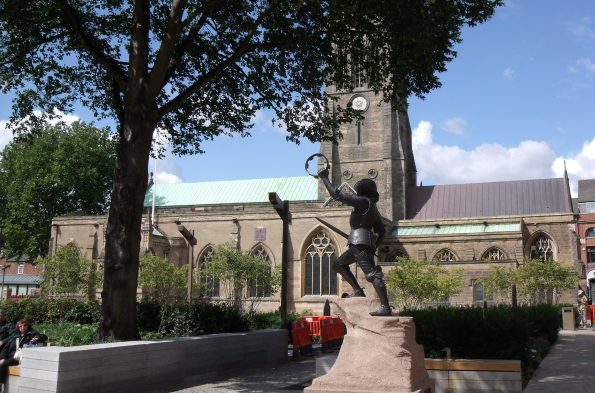Leicester – Visiting the City of the English King, Richard III
I travelled to Leicester on business in August last year. With a couple of hours on my hands between trains, I headed for the Cathedral. St Martin’s church has been on this site for over 1,000 years but has only been a Cathedral since 1927. Named after the early Christian soldier and saint, St Martin of Tours, the church has been in the news recently due to the controversy following the historic exhumation of the remains of the English King, Richard III, from underneath a local car park. After a protracted legal tussle between the cities of York and Leicester, Richard III is to be re-interred in Leicester Cathedral in 2015 on Thursday 26th March.
King Richard III died at the Battle of Bosworth Field on 22 August 1485. Aged 32, he had been King for only two years, and was the last in the line of Plantagenet royalty. St Martin’s has been the place of Richard’s memorial since 1980. This is seen locally as a great honour for the city, as only one memorial stone is permitted for each English monarch. All of this history has placed Leicester firmly in the national and indeed, international spotlight.
On the day of my visit, a large area surrounding the Cathedral was swarming with builders, machinery and workmen. Even the sacred interior of the Cathedral itself was not immune from the noise and bustle as the new tomb and its surrounding ambulatory is readied (at a cost of £1.5m) in time for this year’s high profile ceremony.
What was striking was how, right on 1pm, the builders’ hubbub and the clanging of scaffolding poles subsided, giving way to the quietness and peace of the lunchtime Eucharist. I decided to stay. Incongruously, the service took place in St George’s Chapel, with its strident memorials and brass plaques of the Royal Leicestershire Regiment. It was packed. The priest delivered a thoughtful homily, having first read Bible passages from Ezekiel and Matthew.
Sitting under the flags of past empire; the draped colours of the ‘Tigers’ reflecting the power and dominance of Victorian England, the incumbent spoke of society’s ‘need to align with the values of the Kingdom’. He drew attention to the original manner of the disposal of Richard III’s mortal remains as being so undignified, but that this was the way of all human life returning as we all do, regardless of status, to the dust of the earth.
Interestingly for librarians and booksellers, Richard III whilst King, passed a law protecting the English book trade, enabling education to be pursued. In 1484, at the only Parliament of his reign, Richard devised the first piece of legislation for the ‘protection and fostering of the art of printing and the dissemination of learning by books’, which, as far as I’m concerned, puts Leicester right up there as a ‘notable book-trade site’!




Recent Comments